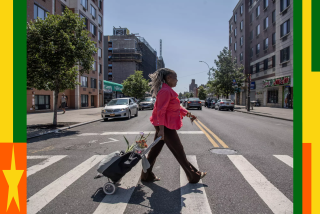Killers Seek Amnesty in Amy Biehl Slaying
- Share via
CAPE TOWN, South Africa — Disclosing in gruesome detail how they killed Amy Biehl, an Orange County Fulbright scholar studying here, four black men on Tuesday sought amnesty from the government on grounds that they understood they should slay whites to further the anti-apartheid struggle.
In sworn statements and testimony to the amnesty committee of this nation’s Truth and Reconciliation Commission, the four men formally acknowledged for the first time that they carried out the August 1993 slaying. They denied the charge at their trial but were found guilty and each sentenced to 18-year prison terms.
“I deeply regret what I did,” said the sworn statement from Mongezi Christopher Manqina, 24. He admitted to sitting down in front of Biehl as she lay wounded and prone against a fence and stabbing her once in the heart with a knife.
“I apologize sincerely to Amy Biehl’s parents, family and friends and I ask their forgiveness,” he said in his statement.
As Manqina’s description of the fatal blow was read by his lawyer in the packed hearing room, Biehl’s father, Peter, wiped tears from his eyes--his only expression of emotion throughout the tense day. His wife, Linda, stared unwaveringly at Manqina, whose own mother staggered from the room as she heard the details of what her son had done.
Two others--Ntobeko Ambrose Peni, 21, and Easy Mzikhona Nofemela, 26--also testified Tuesday. Peni said he stoned Biehl, and Nofemela said he stoned and stabbed at her as she ran. All four men were members of the Pan-Africanist Congress, a small, black nationalist party.
The larger black liberation movement, the African National Congress, which now governs South Africa, always favored a multiracial democracy.
The hearing is to conclude today with testimony from the fourth amnesty applicant, Vusumzi Samuel Ntamo, 25, and a statement from the Biehls.
The Biehls, who now live in Palm Springs, declined to speak with reporters Tuesday, saying they will comment after the hearing ends. They have said that, while they support the reconciliation process, they will neither support nor oppose the amnesty applications in their daughter’s case.
A ruling on the applications will not come immediately.
The amnesty process was established by the constitution adopted after South Africa’s first all-race democratic elections in 1994. Applicants first must disclose fully the human rights crimes they committed. Their cases then are considered under strict criteria designed to separate actions with political motives from other crimes.
About half of the 60 amnesty applications heard so far have succeeded. In all, more than 7,000 applications have been filed.
The mothers of the four convicted men approached the Biehls and shook hands with them before Tuesday’s hearing began. Peter Biehl said to the applicants’ mothers and fathers, “We’re parents too.”
*
Throughout the day, the five-member amnesty committee, led by Supreme Court Judge Hassan Mall, grilled the applicants on whether the killing met the conditions in the law. The four men slouched and looked blankly ahead or stared down at the table in front of them. They did not appear to make eye contact with the Biehls, nor did they show emotion.
As the four entered, a few supporters murmured “Zwelithu!”--Xhosa for “Our country,” a chant of the Pan-Africanist Congress, or PAC.
Testimony suggested that the men were riled up for action at a rally they attended a few hours before the killing that was addressed by leaders of the PAC student wing. At the rally, speakers told the youths to make the townships “ungovernable” and to put into action the slogan “One settler, one bullet.”
Peni, the first to testify, said, “I understood this slogan to apply to every white person who came into the line of fire.”
Asked whether he now knew that what he did was wrong, Peni said: “I feel sorry and very downhearted, realizing the contribution Amy Biehl made to our struggle. I took part in killing someone . . . who worked for our people.”
Biehl, 26, a Stanford graduate from Newport Beach, spent 10 months in South Africa until her death on Aug. 25, 1993, in Guguletu township east of Cape Town. Biehl, who worked on voter education and women’s rights projects, was driving black friends home to Guguletu when she encountered a crowd of youths who had gathered after the rally to stone cars and trucks.
She was badly wounded by a rock thrown through the car window, then tried to stumble to safety, only to be stoned and beaten by several youths and fatally stabbed by Manqina. According to testimony at the trial, Biehl’s friends in the car had shouted in vain to the attackers that Biehl was a comrade.
Norman Arendse, the applicants’ lawyer, argued that Biehl’s killing has to be placed in the political conflict of the period before the election, when many townships became battlegrounds.
*
Under fierce questioning from lawyers and committee members, the three applicants who testified Tuesday offered sometimes contradictory explanations of whether they were carrying out orders to kill whites--or whether they were caught up in the frenzy.
“Isn’t it true that you were involved in a mindless, savage attack on this white person, and it was not political at all?” Peni was asked by Judge Andrew Wilson.
“It had everything to do with politics,” Peni replied.
Nofemela was challenged later: “I put it to you that the murder of Amy Biehl was not a political act. It was wanton brutality, like a pack of sharks smelling blood, isn’t that true?”
“That is not true,” Nofemela answered. “We are not such things.
“It’s because she came to Guguletu during a very wrong moment,” he said. “It’s because the students really wanted the land to go back to the Africans and we were in very high emotions.”
More to Read
Sign up for Essential California
The most important California stories and recommendations in your inbox every morning.
You may occasionally receive promotional content from the Los Angeles Times.










